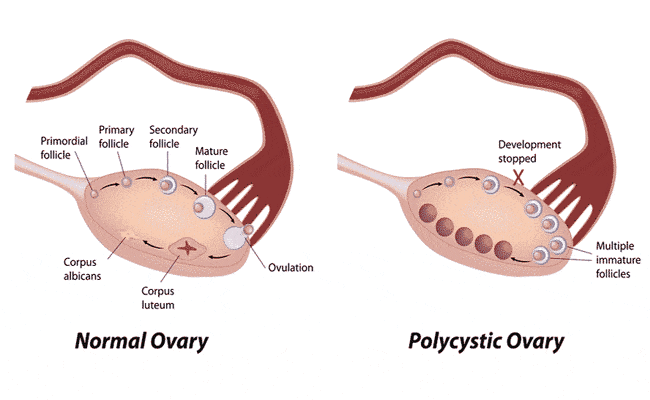It is no surprise that our lifestyle nowadays isn’t very healthy. Due to a shortage of time and an increase in stress in our lives, most of us are subject to various health issues. But the sad part is, we don’t realize it.
Millions of women around the globe are living with Polycystic Ovary Syndrome (PCOS) or PCOD (Poly Cystic Ovarian Disorder). There are yet millions who are not aware that they are suffering from this problem. PCOD is a very common thing in this 21st century. Most of the women tend to ignore it but end up paying the price later. Some women are not aware of what it is and why it happens. Few women are judged based on this. Some women over stress about this causing some more distress.

What is PCOD or PCOS?
PCOD (Poly Cystic Ovarian Disorder) or PCOS (Poly Cystic Ovarian Syndrome) is the most common hormonal problem in women. It is a problem characterized by multiple (‘poly’) cysts (small sacs filled with fluid) in the ovaries. These cysts occur when the regular changes of a normal menstrual cycle are disrupted. Sometimes, it affects several body systems and can cause significant long-term health consequences. These days PCOS is a very common syndrome. There is nothing to worry about it. If treated sooner, you can easily tackle it.
Two other key features of PCOS are:
- Production of excess androgens (male sex hormones)
- Anovulation (the failure to ovulate properly), which makes PCOS the leading cause of infertility.
Statistics state that PCOS/PCOD affects 1 in every 5 women. Today, PCOS is a very widespread reproductive disorder and the leading cause of infertility among women. PCOS is not a gynecological problem, rather an endocrine disorder that changes how your body reacts to some hormones, like insulin.

ImgCredits – Indiatimes
Here are some common symptoms of PCOD/PCOS:
- Irregular periods
- Weight gain and difficulty in losing weight
- Acne
- Oily Skin
- Dandruff
- Excessive hair growth on the face, chest, back
- Thinning of hair
- Infertility
- Pelvic Pain
- Inappropriate Male Features
- Depression
- Miscarriage
- Pot Belly
- High blood pressure
- Diabetes
- High cholesterol
As insulin increases in a woman with this syndrome, it can also lend itself to (acathosisnigracans) or darkened the skin in the neck, armpits and skin tags. Women diagnosed with PCOD/PCOS usually miss their monthly periods by 2-3 months regularly. If, for the first time, you have missed your period for just one month don’t freak out. It may be because of stress or some changes in your lifestyle.
But if you have been missing it continuously, it is high time to take some action. Along with this, if you notice any more of the above symptoms, please get in touch with your doctor immediately. Many women prefer not to consult the doctor and this is one big mistake that they make. They end up facing various complications in the future.
If PCOD/PCOS is gone untreated it can cause:
- Infertility
- Hypertension (High Blood Pressure)
- High Cholesterol
- Severe Pain During Periods
- Higher Rate Of Miscarriage
- Anxiety And Depression
- Sleep Apnea
- High-Risk Pregnancies
- Endometrial Cancer
- Heart Attack
- Diabetes
- Premature Delivery
- Breast Cancer
The earlier your PCOS is diagnosed and treated, the lower your risk of developing these complications. Many times unskilled doctors, parents or girls tend to overlook delayed or missed periods thinking it will get back to normal on its own not knowing that it is not normal to miss periods. Other times, many girls fail to discuss this with their doctors or parents. This leads to PCOD/PCOS going undiagnosed for many women.
How is PCOD/PCOS diagnosed?
Unlike other health conditions, there is no definitive test for PCOS. It is diagnosed by taking a history, doing a physical exam, getting blood tests. Blood tests measure hormone levels as well as:
- thyroid function tests to determine how much of the thyroid hormone your body produces
- fasting glucose tests to measure your blood sugar levels
- lipid level tests to assess the amount of cholesterol in your blood
Sometimes you may even be asked to possibly get an ultrasound or sonography. A vaginal ultrasound allows your gynecologist to create real-time images of your reproductive organs. The most important is a history of irregular periods: if you tell a doctor your periods are irregular, chances are nearly 100% that you have PCOS.
Is there any treatment?
Doctors usually prescribe certain medicines to deal with irregular periods. These are usually based on the severity of your condition and may differ from women to women. Always remember, don’t self-treat PCOD by purchasing over-the-counter medicines. Doctors generally prescribe some pills to help balance the hormones.
Along with these, on a personal level, you can do some things too.
1) Exercise
Exercising is surely going to be your best friend. It plays an important role in releasing stress and regulating hormones. Exercising will also help to ease severe stomach cramps during your periods. Exercise for a minimum of 45 minutes a day, five times a week.
2) Food Habits
Following a strict low-calorie diet is a must. It will help you tackle weight gain. High-fiber foods can help combat insulin resistance by slowing down digestion and reducing the impact of sugar on the blood. Foods like, fresh vegetables, nuts, fruits should be given importance, and try to avoid processed foods, fried foods. If you are overweight, consider stopping milk, cheese, meats, sugary contents, this could avoid getting overweight and gradually reduce your weight.

ImgCredits – pexels.com
3) Addictions
If you are addicted to smoking or drinking you need to stop it right away. Some experts believe that caffeine worsens symptoms of PCOS. So cut down on coffee intake and caffeinated drinks.
Also, many women are under the impression that having PCOD/PCOS will eliminate their chances of getting pregnant. This misconception causes a lot of stress and panic among young girls especially if you are planning to get married soon. Having Polycystic Ovaries doesn’t exactly mean you are infertile. A woman with PCOD can still get pregnant and have a child.
Concluding Thoughts,
Remember PCOS is not a disease, only a disorder. It can be treated with your help. If you suspect you or someone you know has PCOS, be sure to speak with a PCOS friendly doctor and stay informed. Information is the key to living a healthier life!
Hence, let’s all help to spread awareness about PCOD and help out thousands of women out there. Share with your friends. Help others to be aware of the causes of PCOD. Educate others on treatment for PCOD.
Do subscribe with us for more posts and stay tuned.


